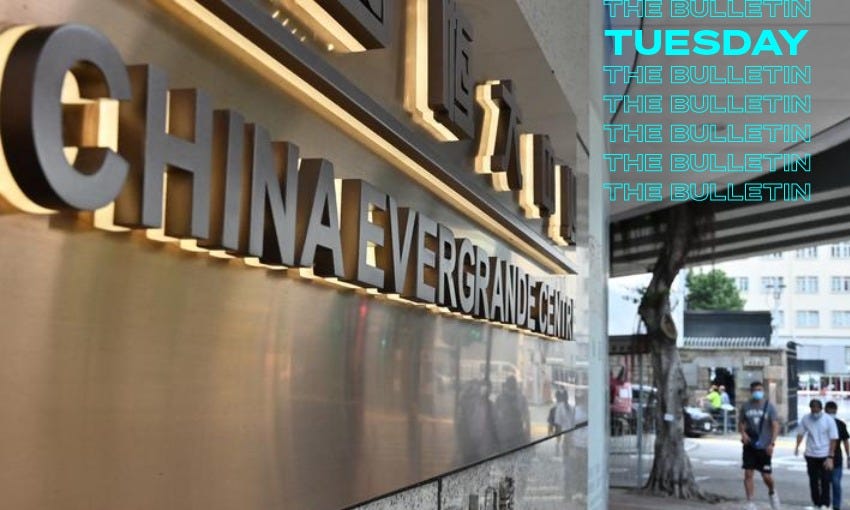China's ticking time bomb
Evergrande, a Chinese property giant, owes its investors hundreds of billions of dollars, it could mean trouble for New Zealand and the world
Mōrena and welcome to The Bulletin for Tuesday, November 9, by Justin Giovannetti. Presented in partnership with Z Energy.
In today’s edition: Vaccine pass needed to fly Air NZ; booster shots approved; Auckland likely to exit lockdown on November 29; but first, Evergrande.
The China Evergrande Centre in Hong Kong. (RNZ/AFP)
The story of Evergrande. Most New Zealanders have never heard of Evergrande, but ongoing money troubles at the massively indebted Chinese developer have set financial markets on edge around the world and raised fears that the company’s collapse could trigger a slump in China’s property market. That would be very bad news for a global economy still crawling out of a Covid-19 recession. The story of Evergrande over the past two months has been one of racing to meet deadlines for interest payments on its $300 billion debt as it teeters on the brink of failure, according to the South China Morning Post. The company is now trying to pay its suppliers in finished apartments instead of cash, which is not a promising sign.
Let’s take a step back, what is Evergrande? As the BBC explains, it’s both a massive real estate developer, with over 1,300 projects across China, as well as a conglomerate that owns financial companies, electric car businesses, food and drink makers, and one of China’s most popular football teams. All that was built on debt. This one company now owes its investors about 50% more money than the grand sum of New Zealand’s economy, give or take a few billion dollars. It’s a staggering amount and the company is struggling to meet interest payments. The company owes money to nearly 300 Chinese financial firms and its collapse could have a big impact on the world’s second-largest economy.
So why should I care about a Chinese property developer? The failure of another company most New Zealanders had never heard of, America’s Lehman Brothers, helped push the world into a global financial crisis. Once companies start falling and the underlying economy has a problem, like China’s incredibly high debt levels, bad things can happen. China’s developers together owe about $7.3 trillion in debt—that’s trillion, not a typo. However, Evergrande’s collapse might not happen. Business Insider reports that the company is likely too big to fail and experts expect the Chinese government to find a solution. The company has also been selling off assets in recent days, including a British electric car startup and its fleet of corporate jets.
The future will be a little messy and uncertain. The company is under a barrage of nearly constant deadlines to pay creditors and has resorted to paying at the last moment, minutes before extensions and grace periods on payments expire. The Guardian reports that some of its recent payments have come out of the personal bank account of its founder, Hui Ka Yan. Over the weekend, Reuters reported that another series of interest payments weren’t made, likely kicking off another 30-day grace period for the company to find the necessary cash. Banks, investors and governments around the world will now hope that another payment clears, likely minutes before this latest extension ends. If you keep seeing Evergrande in the headlines, this is why. One of the world’s most indebted companies is stuck in a rolling maul and if it ever drops the ball, a chunk of the global financial system might go with it.
If you like what you’re reading, we need your support. The Spinoff is doing our utmost to keep you updated on Covid-19 related news. Every dollar our members contribute directly funds our editorial team and is devoted to ensuring we do more. Click here to learn how you can support the team today.
Air New Zealand to require proof of jab or negative test to fly. From the middle of December, all domestic travellers will need to show a vaccine certificate before boarding a flight, the NZ Herald reports. Those who aren’t fully vaccinated will need to carry a negative test result from 72 hour before departure. The airline said it received “overwhelming feedback” from travellers for the move.
Auckland and upper Northland to ease restrictions, while booster shots have been approved. As The Spinoff’s live updates report, Auckland will enter level three, step two at midnight. While the city is experiencing the largest, most widespread outbreak in the country’s history, the prime minister said high vaccination rates justify the move. Upper Northland should move back to level two on Thursday. According to RNZ, boosters for the Pfizer jab are also coming for everyone aged over 18, at least six months after their second dose, after approval from Medsafe.
The Covid numbers: There are 81 cases in hospital and 7 in ICU/HDU. There are now 2,718 active cases in New Zealand. 182 new community cases were reported in Auckland yesterday, 7 in Waikato and 1 in Northland. 14,280 people were vaccinated on Sunday.
The Spinoff’s Covid data tracker has the latest figures.
The 90% vaccine target could be dropped as government eyes making life harder for unvaccinated. As Jo Moir reports for Newsroom, the prime minister is considering a shake-up of future alert level plans as vaccination levels have flat-lined outside Auckland. It’s November and first doses in some DHBs are still just above 80% of eligible people, as life under level two feels quite regular for the unvaccinated. The traffic light system has permanent restrictions on the unvaccinated, even at the lowest alert setting. Auckland is very likely to move to the traffic light system on or right after November 29. Cabinet is now discussing moving the whole country over as well, adding vaccine certificates to daily life.
MIQ poses less risk than an Auckland supermarket trip. The case for the country’s border facilities is growing weaker after a group of prominent academics, including Michael Baker and Nick Wilson, have concluded vaccinated travellers should be allowed to skip MIQ and enter Auckland. As Stuff reports, the Auckland border does a lot of heavy lifting keeping Covid-19 out of the rest of the country. It’s astounding that the group, which is generally quite conservative when it comes to risk, finds Countdown to be riskier than 14 days in the Pullman.
This week is Apec Leaders' Week, the final part of New Zealand's year as host. As part of Leaders' Week, the first ever virtual Apec CEO Summit will be broadcast from Auckland’s Aotea Centre. The Spinoff spoke to some of the local participants about their vision for the future. Read the story here—created in partnership with Mfat.
Auckland council is headed to court over 600 trees. Over the past decade, the city has chosen not to add more trees to its protected register citing “resources”, and the Tree Council has had enough. These are tall, notable trees, the ones most people see value in protecting. Council is being brought to court and according to Stuff, the group warns 1000 trees are being felled weekly in urban Auckland.
The wool industry has approved a merger to try to save itself. Farmers Weekly reports that Wools of New Zealand and the Primary Wool Co-operative have overwhelmingly voted to join up and shift the industry’s focus from growing a raw commodity to making branded consumer products. Times are tough and growers hope that creating a single Big Wool will focus efforts on selling stuff.
Got some feedback about The Bulletin, or anything in the news?
Get in touch with me at thebulletin@thespinoff.co.nz
Right now on The Spinoff: Siouxsie Wiles writes that the first anti-Covid pills are great news, but we still need to get vaccinated. Toby Manhire looks at Australia’s borders to see what we can learn ahead of a Christmas reopening for Auckland. Charlotte Muru-Lanning reports on how Rawiri Waititi’s Jordans became a political issue. Chris Schulz reviews the new Dexter and asks if the revival was necessary.
For a longer read today, a look at climate leadership. Many climate activists have lamented what they see as a lack of urgency at the Cop26 summit. As The Atlantic reports, they see leadership not in the halls at Glasgow, but in protests on the streets. However, they admit that not enough people are out in force. Yet. While the focus of climate talks is about 1.5 degrees of warming, activists are now working with their own number of 3.5%. The Atlantic explains:
But some environmental campaigners have worked with a particular number in mind: 3.5%. This comes from the work of the political scientist Erica Chenoweth, whose research found that nonviolent movements require the active participation of at least 3.5% of a population in order to achieve serious political change.
All Blacks to face a challenge in Ireland. The team won over the Italian side 47-9, a great outcome in any other context, but it was seen as a disjointed performance and sign that a long road schedule is draining the All Blacks. The NZ Herald (paywalled) writes that the men in green are now confident they can put on a real challenge in Dublin on Sunday and send the All Blacks packing.
That's it for The Bulletin. If you want to support the work we do at The Spinoff, please check out our membership programme.







